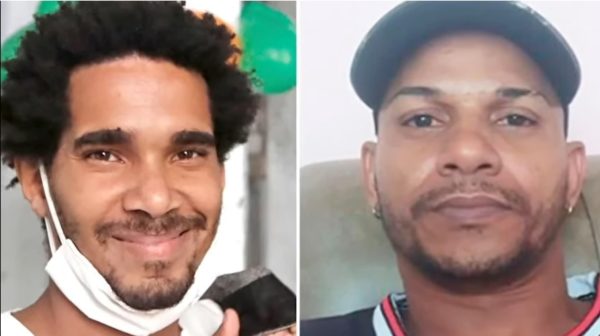6 de julio 2022

Children of Exile: The Births “Sowing Hope” in the Camp of Nicaraguan Farmers

PUBLICIDAD 1M
PUBLICIDAD 4D
PUBLICIDAD 5D
Luis Alberto Mariño and Gisella Morfi analyze the recent convictions of artists in Cuba, Daniel Ortega’s political ally

Luis Alberto Mariño and Gisella Morfi analyze the recent convictions of artists in Cuba
Cuban artist Luis Alberto Mariño, exiled in Argentina, and Gisella Morf, of the Cubalex Information Center, denounced the sentences of five and nine years in prison, imposed June 24 on Cuban political prisoners, Luis Manuel Otero Alcantara and Maykel Castillo Perez, calling the sentences a display of a “totalitarian dictatorship.”
The trial was carried out behind closed doors in the People’s Municipal Court of Centro Habana. In an interview with the television program Esta Noche both Mariño and Morfi condemned the political basis of the judicial decision.
Otero, 34, is the leader of the San Isidro Movement and one of Castro’s most brazen critics. Castillo is co-author of the song “Patria y Vida,” (Homeland and Life) a hymn of resistance during the peaceful anti-government protests on July 11.
Luis Alberto, why has the Cuban dictatorship been so harsh with these artists?
First, because a totalitarian dictatorship is afraid of anyone who thinks differently, and more so if they make it public. Luis Manuel and Maykel have embodied all the disenchantment of a generation that has seen the disaster, seen the lies reflected again and again in the official media news, in the statistics, in everything. A generation that has seen that the official discourse has nothing to do with reality.
Maykel became a great influencer, just by going live from his phone, exposing reality, interviewing people even though he’s not a journalist, but simply out of pure empathy, pure sensitivity, showing how Cubans live. And Luis Manuel, on the other hand, making art, giving performances, testing the margins and limits established by the Cuban totalitarian State to contain all forms of art in an arena controlled by them. The regime fears them not only because of their testimonies, but because of what it produces in society.
Giselle, what crimes did the People’s Supreme Court of Cuba charge Otero and Castillo with?
They are being punished for the crime of insulting the symbols of the homeland, for contempt and defamation of the institutions and organizations of heroes and martyrs, of attack, resistance, and public disorder. The Prosecutor’s Office requested that Luis Manuel Otero Alcántara be sentenced to seven years, and the Court imposed a five-year sentence. In Maykel’s case, the Prosecutor’s Office asked for 10 years, but in the end, they imposed nine.
Giselle, several national and international human rights organizations have denounced that this was a political trial. What arbitrariness were you able to document during the process?
They are being punished for common crimes, but if we look at the text of the sentence, where it addresses the identification of the case, the file shows that all the related actions were handled by the specialized body of criminal investigation of crimes against State Security. This is completely out of place, totally inappropriate, and if it were ordinary crimes that body would have no jurisdiction.
At first, we see the violations of due process. Secondly, they were arbitrarily detained since these crimes are entirely incompatible with international human rights treaties. They are accused of offences that criminalize fundamental rights such as freedom of expression, and citizen participation in public life. Therefore, their treatment has been like that of political prisoners.
Even though the convictions are recent, Luis Manuel and Maikel have been in prison for over a year since their arrests in 2021. Giselle, is it known what their state of health is?
There have been reports of sensitive health conditions. In Maykel’s case, there have been systematic complaints about his health regarding a skin condition, but no studies have been done to identify the problem. All medical institutions are part of the state apparatus, and Maykel cannot select his medical care. Added to this is that there is a health crisis in Cuba, with a shortage of everything including medicines. Medical care within the prison is not timely, not efficient, and additionally, medical attention depends on a prisoner’s behavior.
Luis Alberto, how did the citizens react to the punishments against Otero and Castillo, and what impact does their convictions have on the independent artistic movement on the island?
People reacted with condemnation, with sadness and with a will to continue fighting for them to not serve the sentences, to continue demanding their freedom and to continue demanding that international organizations ensure human rights rather than continue with the pragmatic pacts they make with dictatorships. Cuban society, Cuban activists, are sad, upset, and horrified at the arbitrariness of the regime towards two well-known people. Imagine what happens to those who are unknown.
Giselle, almost a year after the peaceful anti-government protests, what is the situation like for the Cuban people? Can they go out and protest?
Maykel’s and Luis Manuel’s sentences, along with all the sentences stemming from July 11, have a similar deterring effect: They serve as examples for the whole society with the aim of intimidating all people so that they do not go out to protest, so that they don’t demonstrate, so that they do not express themselves. Freedom of thought, freedom of expression, freedom of conscience, the right to peaceful protest, are rights that are being persecuted in Cuba.
This article was originally published in Spanish and translated by Havana Times

Archivado como:
PUBLICIDAD 3M
Periodista y productora audiovisual nicaragüense. Licenciada en Ciencias Políticas. Cofundadora de varias organizaciones de sociedad civil vinculadas a la lucha por los derechos de la comunidad estudiantil en Nicaragua. También se ha desempaño en proyectos de transformación digital para empresas y organizaciones.
PUBLICIDAD 3D